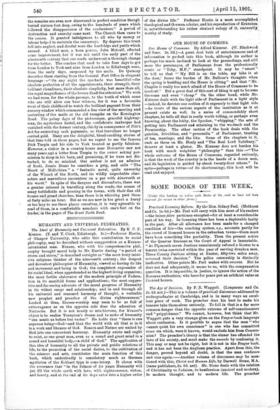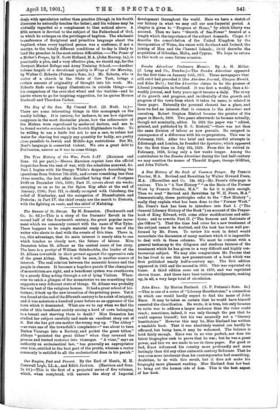The Age of Decision, By P. N. Waggett. (Longmans and
Co. 2s. 6d. net.)—This is a volume of practical discourses addressed to undergraduates at Cambridge, and is in many ways an excel- lent piece of work. The preacher does his best to make his hearers take themselves seriously. To fail in that is a far more common danger than the opposite extreme of self-consciousness and "priggishness." We cannot, however, but think that Mr. Waggett puts a very strange gloss on the Prayer-book language about confession. Is it possible to argue that the man "who cannot quiet his own conscience" is one who has committed some sin which, were it known, would exclude him from Commu- nion? The preacher's theory is that the sinner has offended the laws of his society, and must make the amends by confessing it. This may or may not be right, but it is not in the Prayer book, and it has not been the Anglican practice. Apart from this, the danger, proved beyond all doubt, is that the man confesses and sins again.—Another volume of discourses may be men- tioned with this, Christ and Human Life, by Darwell Stone, M.A. (same publishers, 2s. 6d. net). Mr. Stone deals with the relation of Christianity to Judaism, to heathenism (ancient and modern), to modern thought, and to modern life. The preacher deals with speculation rather than practice (though in his fourth discourse he naturally touches the latter), and his volume may be virtually regarded as a complement to that noticed above. A fifth sermon is devoted to the subject of the Fatherhood of God, in which he enlarges on the privileges of baptism. The wholesale transference of Scriptural and primitive language about the baptised, when every baptised person was a confessor, if not a martyr, to the totally different conditions of to-day is likely to land the preacher in the most serious difficulties.—The Power of a Mother's Prayer, by II. Scott Holland, MA. (John Murray, is.), is practically a plea, and a very effective plea, we should say, for the Newport Market Refuge and Army Training School.—Another volume largely of a devotional quality is Wings of the Morning, by Walter C. Roberts (Putnam's Sons, 5s.) Mr. Roberts, who is rector of a church in the State of New York, brings a certain amount of originality of thought into his work. Mr. Roberts finds some happy illustrations in outside things—see his comparison of the over-shot wheel and the 'turbine—and he knows where to go for inspiring suggestion, for he quotes Horace Bushnell and Theodore Parker.







































 Previous page
Previous page